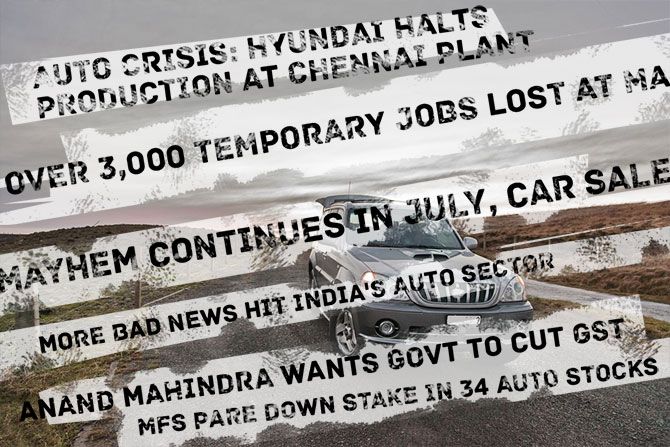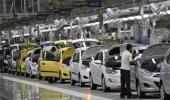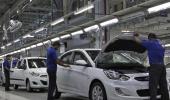'The government has done its part; it is the best they could do'
'It is a big shot in the arm for the auto industry'
'Never in the history of automotive industry in India, we have had such a bad phase'
Illustration: Dominic Xavier/Rediff.com

Is the automobile sector in India going through a huge crisis right now?
Will the measures announced by the government on Friday, after the industry made several recommendations, help the auto sector come out of the slump?
Vinnie Mehta, below, director general, Automotive Component Manufacturers Association of India (ACMA) explains the situation in an interview to Rediff.com's Shobha Warrier.
Do you think the general slowdown of the economy is the reason why the auto industry is facing one of the worst crises in its history? Reports say that July was the worst time in 19 years for the auto industry in India.
It is an unprecedented situation at this juncture.
Never in the history of automotive industry in India, have we had such a bad phase.
Month on month for the last 12 months, the sales have been dropping in every segment of the vehicle industry whether it is the two-wheeler or the car or the heavy vehicles or the tractors.
A very ugly ramification of this is, people are being laid off and that is a very big concern.
Another concern is, investments are being put off.
So, it is a very bad time for the economy and the automotive industry.
The general slowdown of the economy is because of the liquidity crisis and I consider this as the first issue. One of our recommendations to the government was to help tide over the liquidity crisis as it would help everybody and not just the auto sector.
Liquidity crisis in the banking sector and also the NBFCs?
Yes, both banking and NBFCs. Some 70% of the vehicles are purchased on loans. So, when there is a liquidity crunch, it impacts both at the consumer level and also at the retail level.
Now that the government has stepped in and come out with some measures to help the industry, do you think there will be a turnaround?
We are extremely happy with the measures taken by the finance minister. We must thank the government for stepping in.
Other than taking care of the liquidity crisis, the RBI also has pumped in Rs 1.76 crores to the government based on the Jalan Committee report. I think this will go a long way and act as a big shot in the arm for reviving the entire economy as it is not just the auto sector but several other sectors are suffering.
To be fair, the government has done what it could do in such a short time period.
 What was the reason for this slump?
What was the reason for this slump?
There are multiple reasons that have led to this situation.
It started with the elections. During the election period, there will be some sort of uncertainty. So, we thought once the new government came to power, there would be stability and things would look up.
Unfortunately, soon after the elections, we were confronted with a delayed monsoon, which became an erratic monsoon later. When monsoon becomes erratic, it affects the rural economy affecting the sales of the two-wheelers, entry level cars and tractors. So, they got impacted badly.
Then, the insurance premium went up and it had a very negative impact on the two-wheeler industry which is very price sensitive market. Insurance cost going up by Rs 3000 to Rs4000 to Rs 5000 means a rise of 7-8% of the price of a two-wheeler.
The industry has invested heavily in transitioning from BS4 to BS6 which are emission norms to make the vehicles less polluting. That apart, there are many safety regulations that are mandated by the government. As a result of which the cost of the vehicles is going up.
Anyway, with the government making it very clear that BS4 vehicles are not going to be obsolete soon, is a big consolation for the industry.
You wanted the government to introduce a scrappage policy and they have done that…
Yes, we wanted the government to introduce the scrappage policy by which vehicles over 15 years of age are taken off the road and recycled. This can create demand for new vehicles as you will be replacing the old vehicles with new ones with better technology that addresses the problem of pollution. They are also be more fuel efficient.
We are happy that the government listened to us and came up with a scrappage policy.
There is no doubt about the fact that what the government has come out are very reassuring measures, very welcome ones.
You wanted the government to reduce the GST rate for a shorter period from 28% to 18% across the vehicle industry and component industry as the long-term plan of the government was to make the GST rate at 18%. But the government has not touched the GST rates.
Again, to be fair to the government, GST is not the subject of the central government alone; it also involves the state governments.
In the case of the auto component industry, 70% of the items are at 18% rate but we have been asking for an 18% rate for the entire component industry.
We are hopeful that when the GST council meets, they will have a benign consideration of this request from the industry.
How has the global sentiments like the trade war between the US and China affected the industry?
Exports of auto components is not much. Auto components industry is a $57 billion industry in terms of production and last year, we exported around $15.7 billion. That means export is about a quarter of the production.
Though our single largest market is the US with 25% of the exports but Europe with 33% exports is also very significant. Though US is a big market for us, for the US, we are a small player as we export only 2% of their overall component consumption. So, the global turmoil has not affected us as much.
I would say the China-US spat can be looked at as an opportunity for India. Can India take the place of China when the US clamps imports from China?
But at this juncture, our whole focus is the home market which is very dominant.
We had an almost normal monsoon. Now that the government has come out with a package for the industry, are you hopeful of a revival now?
Full marks to the finance minister and her team, and also to the Jalan Committee. We hope things would look better hereafter. In fact, this is the right time for the government to come out with these measures as it augurs very well with the festive season.
It was a delayed monsoon but it is an almost normal monsoon. So, we are expecting a positive impact in the festive season which is around the corner with Ganpati festival and Onam.
We are happy that the government has come up with this kind of a revival package at this juncture. It is a big shot in the arm for the auto industry. We are sure that these incentives from the government will boost the consumer sentiments.
A good monsoon, arrival of the festive season, along with the boosters from the government, we hope that the industry bounces back.
You had said that with the green shoots appearing, the plant needed watering. So, you feel the government has done the watering now?
If you look at the retail data which was published recently, the sales of cars have increased by 7% month on month. I am talking about retail sales and not the production. That’s why I said the green shoots have started to emerge and it needed to be manoeuvred and watered.
Yes, I think the government has done its part; it is the best they could do.
Do you think with these measures, the job losses which many feared, would not happen?
We have to wait and watch. Hopefully this will help the industry come back on track. It is all about the industry coming back on track.
I would say the government has taken the right measures and now the ball is squarely in the industry’s court to deliver. I hope misgivings like firing people are behind us.










 © 2025
© 2025